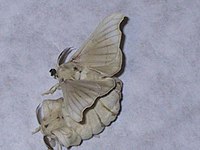
Photo from wikipedia
Moths and butterflies (Lepidoptera) have sex chromosome systems with female heterogamety, and two models, W-dominance and Z-counting, have been proposed to determine sex. The W-dominant mechanism is well known in… Click to show full abstract
Moths and butterflies (Lepidoptera) have sex chromosome systems with female heterogamety, and two models, W-dominance and Z-counting, have been proposed to determine sex. The W-dominant mechanism is well known in Bombyx mori. However, little is known about the Z-counting mechanism in Z0/ZZ species. We investigated whether ploidy changes affect sexual development and gene expression in the eri silkmoth, Samia cynthia ricini (2n = 27♀/28♂, Z0♀/ZZ♂). Tetraploid males (4n = 56, ZZZZ) and females (4n = 54, ZZ) were induced by heat and cold shock, and then triploid embryos were produced by crosses between diploids and tetraploids. Two karyotypes (3n = 42, ZZZ and 3n = 41, ZZ) were identified in triploid embryos. Triploid embryos with three Z chromosomes showed male-specific splicing of the S. cynthia doublesex (Scdsx) gene, whereas two-Z triploid embryos showed both male- and female-specific splicing. From larva to adult, three-Z triploids showed a normal male phenotype, except for defects in spermatogenesis. However, abnormal gonads were observed in two-Z triploids, which showed both male- and female-specific Scdsx transcripts not only in the gonads but also in somatic tissues. Two-Z triploids were thus obviously intersexes, suggesting that sexual development in S. c. ricini depends on the Z:A ratio and not only on the Z number. Moreover, mRNA-seq analyzes in embryos showed that relative levels of gene expression are similar between samples with different doses of Z chromosomes and autosome sets. Our results provide the first evidence that ploidy changes disrupt sexual development but have no effect on the general mode of dosage compensation in Lepidoptera.
Journal Title: Genetics
Year Published: 2023
Link to full text (if available)
Share on Social Media: Sign Up to like & get
recommendations!